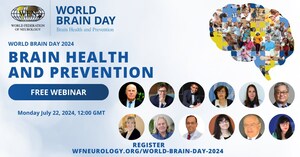LONDON, Nov. 18, 2019 /PRNewswire/ -- World Federation of Neurology — For women living with MS, pregnancy, and breastfeeding were once thought to slow the progression of the disease. During the XXIV World Congress of Neurology (WCN 2019) in Dubai, UAE, which took place Oct. 27-31, 2019, experts revealed that may not be the case.
New research was unveiled on pregnancy and MS by Professor Mar Tintore, MD, PhD, the clinical chief of neurology in the Neurology-Neuroimmunology Department at the Multiple Sclerosis Centre of Catalonia at the Hospital Vall d'Hebron. Through her research, Prof. Tintore found that how data is analyzed can lead to a misunderstanding of whether pregnancy can impact the long-term prognosis of MS—a shift from earlier studies about the interaction between pregnancy and MS.
"Comparing women who had any pregnancy during their disease with women who had not experienced pregnancy during their disease, what you see is that women with pregnancy are better off than those who had never been pregnant," says Prof. Tintore. "This is not exactly the case when you consider other factors, which makes it likely that pregnancy doesn't change the trajectory of the disease."
Pregnancy may not modify long-term prognosis, but research shows that there is an impact on short-term prognosis. Other factors play an important role in MS such as a patient's age, gender, baseline lesions, and if they are on treatment and for how long.
"To advertise that pregnancy has a very important impact and will positively modify your long-term prognosis is something we must be cautious about because studies show it is not true," says Prof. Tintore. "It could cause patients to think pregnancy can replace treatment and may cause confusion for providers who think pregnancy would treat the disease."
Reflecting this data, the previously held idea that women with MS should not become pregnant has changed to involve an increased amount of family planning. Bridge therapies are an important step in preparing for pregnancy while living with MS.
"If a woman stops treatment and tries to get pregnant, the disease can make a rebound and become very active," says Prof. Tintore. "Women with MS should plan and organize their pregnancy with their doctor to approach the chapter of life thoughtfully and with the mother's health top-of-mind."
WCN 2019, hosted by the World Federation of Neurology, brought together leaders in neurology to present new research, hold educational sessions and inspire action on topics ranging from MS and migraine to epilepsy and climate change.
About the World Federation of Neurology
The World Federation of Neurology represents 120 member neurological societies around the globe to foster quality neurology and brain health worldwide by promoting neurological education and training with an emphasis on under-resourced areas of the world. WFN supports the spread of accurate research and clinical information in the pursuit of improvements in the field of neurology. With support from member organizations around the globe, WFN unites the world to allow patients greater access to brain health. For more information, please visit the WCN 2019 web site at www.wfneurology.org or by searching using the tag #WCN2019.
Media Contact
Yakkety Yak Contact:
Ashley Logan, Yakkety Yak LLC
press@yakketyyak.com
Logo - https://mma.prnewswire.com/media/1013533/WFN_Logo.jpg






Share this article